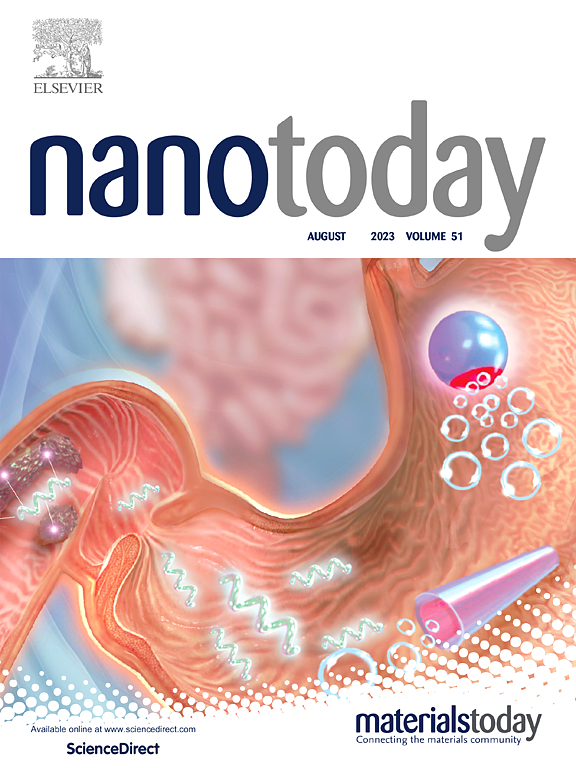Non-invasive CRISPR/Cas9 nanocapsules specifically edit α-synuclein for effective Parkinson’s disease treatment
IF 10.9
1区 材料科学
Q1 CHEMISTRY, MULTIDISCIPLINARY
引用次数: 0
Abstract
Parkinson’s disease (PD) is the most common movement disorders, affecting more than 1 % of the elderly population aged over 60 years old. Targeting the accumulation of the toxic protein α-synuclein (α-Syn) (SNCA) is a common therapeutic strategy for PD. CRISPR/Cas9 gene technology could provide an avenue to achieve reduced levels of this protein. However, the lack of effective and safe brain delivery vectors greatly hampers its applications for brain disorders. In this paper, we developed glucose directed single-particle nanocapsules that efficiently delivers CRISPR/Cas9 into targeted brain lesions to specifically edit the SNCA gene. Our CRISPR/Cas9 nanocapsules have a small size of 32 nm and formed with a polymeric shell which protects Cas9/sgRNA from enzymatic degradation. Benefitting from surface glucose decoration, our nanocapsules exhibited blood brain barrier (BBB) permeability and accumulation in brain lesions after intravenous administration. Additionally, CRISPR/Cas9 nanocapsules selectively reduced expression of the SNCA leading to down regulation of α-Syn protein, M1/M2 microglial re-polarization, amelioration of neuroinflammation and recovery of tryptophan hydroxylase (TH) in A53T transgenic mice. Importantly, CRISPR/Cas9 nanocapsules significantly improved performance of mice in a variety behavioral test with negligible side effects. Therefore, the CRISPR/Cas9 nanocapsules provides a versatile but potent platform for genetic engineering in brain disorders, especially genome mutations relevant to neuronal disease.
非侵入性CRISPR/Cas9纳米胶囊特异性编辑α-突触核蛋白,有效治疗帕金森病
帕金森病(PD)是最常见的运动障碍,影响超过1 %的60岁以上老年人口。靶向毒性蛋白α-突触核蛋白(α-Syn) (SNCA)的积累是PD的常用治疗策略。CRISPR/Cas9基因技术可以提供降低这种蛋白水平的途径。然而,缺乏有效和安全的脑传递载体,极大地阻碍了其在脑疾病中的应用。在本文中,我们开发了葡萄糖定向单颗粒纳米胶囊,可以有效地将CRISPR/Cas9递送到靶向脑病变中,特异性编辑SNCA基因。我们的CRISPR/Cas9纳米胶囊具有32 nm的小尺寸,由聚合物外壳形成,可以保护Cas9/sgRNA免受酶促降解。得益于表面葡萄糖修饰,我们的纳米胶囊在静脉给药后表现出血脑屏障(BBB)的渗透性和脑病变的积聚。此外,CRISPR/Cas9纳米胶囊选择性地降低SNCA的表达,导致A53T转基因小鼠α-Syn蛋白下调、M1/M2小胶质细胞再极化、神经炎症改善和色氨酸羟化酶(TH)恢复。重要的是,CRISPR/Cas9纳米胶囊显著提高了小鼠在各种行为测试中的表现,副作用可以忽略不计。因此,CRISPR/Cas9纳米胶囊为大脑疾病,特别是与神经元疾病相关的基因组突变的基因工程提供了一个多功能但有效的平台。
本文章由计算机程序翻译,如有差异,请以英文原文为准。
求助全文
约1分钟内获得全文
求助全文
来源期刊

Nano Today
工程技术-材料科学:综合
CiteScore
21.50
自引率
3.40%
发文量
305
审稿时长
40 days
期刊介绍:
Nano Today is a journal dedicated to publishing influential and innovative work in the field of nanoscience and technology. It covers a wide range of subject areas including biomaterials, materials chemistry, materials science, chemistry, bioengineering, biochemistry, genetics and molecular biology, engineering, and nanotechnology. The journal considers articles that inform readers about the latest research, breakthroughs, and topical issues in these fields. It provides comprehensive coverage through a mixture of peer-reviewed articles, research news, and information on key developments. Nano Today is abstracted and indexed in Science Citation Index, Ei Compendex, Embase, Scopus, and INSPEC.
 求助内容:
求助内容: 应助结果提醒方式:
应助结果提醒方式:


